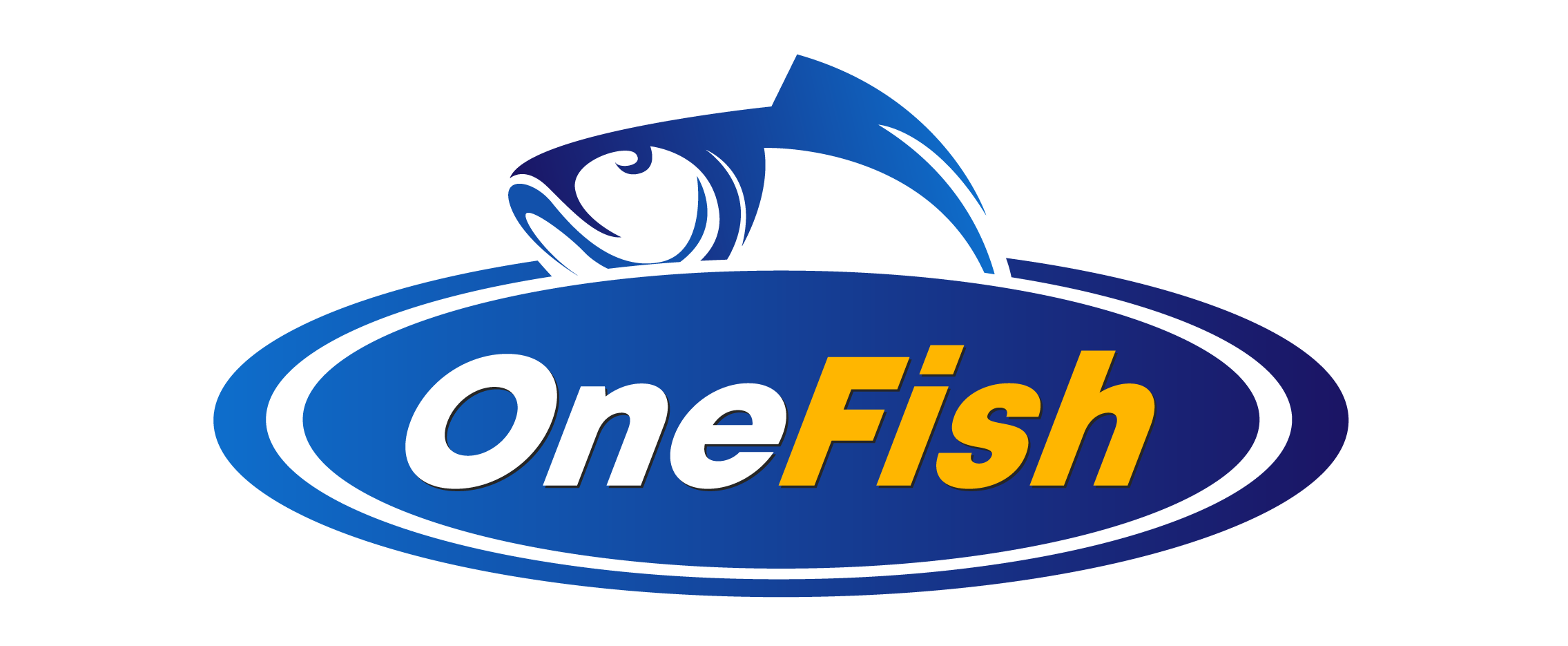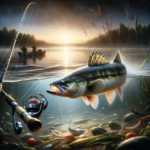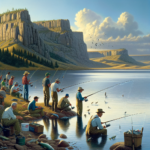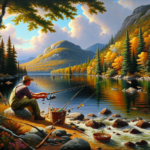Bassmaster Open in Tennessee
Introduction
Did you know that Tennessee is home to some of the most competitive and thrilling bass fishing tournaments in the United States? The Bassmaster Open in Tennessee is a prime example, drawing anglers from across the country to test their skills in the Volunteer State’s rich and diverse waters.
This article will delve into the intricacies of the Bassmaster Open in Tennessee, covering everything from the best fishing techniques and species information to top fishing spots and seasonal considerations. Whether you’re a seasoned angler or a novice looking to get started, this guide will provide you with all the information you need to make the most of your fishing experience in Tennessee.
Understanding the significance of the Bassmaster Open is crucial for anyone interested in competitive fishing. This event not only highlights the best fishing spots in Tennessee but also showcases the techniques and gear that can make or break a fishing trip. Let’s dive in!
Background/Context
Historical or Cultural Significance
The Bassmaster Open series has a storied history, serving as a proving ground for anglers aspiring to make it to the Bassmaster Elite Series. Tennessee, with its rich fishing culture and abundant water bodies, has been a key location for these tournaments. The state’s lakes and rivers have long been celebrated for their bass fishing opportunities, making it a natural choice for hosting such prestigious events.
Geographical Overview
Tennessee boasts a diverse range of water bodies, from the expansive reservoirs of the Tennessee River system to the smaller, more secluded lakes and streams. The climate varies from the humid subtropical conditions in the west to the more temperate climate in the east, providing a range of fishing environments. The local ecosystem is rich and varied, supporting a wide array of fish species, including largemouth bass, smallmouth bass, and spotted bass.
Key Points/Details
Fishing Techniques
Technique Overview
In the Bassmaster Open, anglers employ a variety of techniques to catch bass. Some of the most popular methods include:
- Crankbait Fishing: Effective for covering large areas and targeting active fish.
- Jigging: Ideal for fishing in deeper waters or around structures.
- Topwater Fishing: Exciting and effective, especially during early morning or late evening.
- Drop Shotting: Perfect for targeting bass in clear waters or during tough conditions.
When and Where to Use
Each technique has its optimal conditions:
- Crankbait Fishing: Best used in open waters or along rocky shorelines during warmer months.
- Jigging: Effective year-round, particularly in areas with underwater structures or vegetation.
- Topwater Fishing: Most effective during low light conditions, such as dawn or dusk.
- Drop Shotting: Ideal for clear waters and during periods of high fishing pressure.
Recommended Gear
For each technique, specific gear is recommended:
- Crankbait Fishing: Medium-heavy rod, baitcasting reel, and a variety of crankbaits.
- Jigging: Heavy rod, baitcasting reel, and a selection of jigs.
- Topwater Fishing: Medium rod, spinning reel, and topwater lures like poppers and frogs.
- Drop Shotting: Light to medium rod, spinning reel, and drop shot rigs.
Species Information
Species Overview
The primary target species in the Bassmaster Open are:
- Largemouth Bass: Prefers warm, shallow waters with plenty of cover.
- Smallmouth Bass: Found in cooler, clearer waters, often around rocky areas.
- Spotted Bass: Inhabits both clear and murky waters, often around structures.
Best Practices
To successfully catch these species, consider the following tips:
- Largemouth Bass: Use soft plastics and jigs around vegetation and structures.
- Smallmouth Bass: Opt for crankbaits and jerkbaits near rocky shorelines and drop-offs.
- Spotted Bass: Employ spinnerbaits and swimbaits around submerged structures.
Location Information
Top Fishing Spots
Tennessee offers numerous prime fishing locations, including:
- Lake Chickamauga: Known for its trophy-sized largemouth bass.
- Douglas Lake: Offers excellent smallmouth and largemouth bass fishing.
- Pickwick Lake: Famous for its diverse bass population and scenic beauty.
Regulations and Licenses
Before fishing in Tennessee, ensure you are aware of the local regulations:
- Fishing License: Required for all anglers aged 13 and older. Available online or at local retailers.
- Catch Limits: Vary by species and location. Check the Tennessee Wildlife Resources Agency (TWRA) website for specifics.
- Seasonal Restrictions: Some areas may have seasonal closures or specific regulations. Always verify before fishing.
Seasonal Considerations
Seasonal Variations
Fishing conditions in Tennessee change throughout the year:
- Spring: Bass are in pre-spawn and spawn phases, making them more aggressive and easier to catch.
- Summer: Fish move to deeper, cooler waters. Early morning and late evening are the best times to fish.
- Fall: Bass feed heavily in preparation for winter, providing excellent fishing opportunities.
- Winter: Fish are less active but can still be caught using slow, deliberate techniques.
Best Times to Fish
The optimal times for fishing in Tennessee are:
- Spring: Late March to early June.
- Summer: Early morning and late evening from June to August.
- Fall: September to November.
- Winter: December to February, focusing on midday when temperatures are warmer.
Events and Tournaments
Event Overview
The Bassmaster Open in Tennessee is a highlight of the fishing calendar, typically held in the spring or fall. The event attracts top anglers from across the country, all vying for a spot in the prestigious Bassmaster Classic.
Preparation Tips
To prepare for the Bassmaster Open, consider the following tips:
- Gear Preparation: Ensure all equipment is in top condition, including rods, reels, and lines.
- Practice: Spend time on the water practicing different techniques and familiarizing yourself with the tournament location.
- Strategy: Develop a game plan based on current conditions and past experiences.
Tips and Best Practices
General Tips
Here are some general tips to enhance your fishing experience:
- Stay Patient: Fishing requires patience and persistence. Don’t get discouraged if you don’t catch fish immediately.
- Observe Nature: Pay attention to the behavior of birds and other wildlife, as they can provide clues about fish activity.
- Stay Organized: Keep your gear organized and easily accessible to maximize your time on the water.
Avoid Common Mistakes
Common mistakes to avoid include:
- Overcasting: Casting too far can spook fish. Aim for accurate, controlled casts.
- Ignoring Weather: Weather conditions greatly affect fish behavior. Always check the forecast before heading out.
- Using the Wrong Gear: Ensure your gear matches the technique and conditions you’re fishing in.
Advanced Techniques
For those looking to take their fishing to the next level, consider these advanced techniques:
- Finesse Fishing: Use lighter lines and smaller lures to target finicky fish in pressured waters.
- Electronics: Utilize fish finders and GPS to locate fish and navigate waters more effectively.
- Pattern Fishing: Identify and exploit patterns in fish behavior based on environmental conditions.
Gear and Equipment Recommendations
Essential Gear
The essential gear for bass fishing in Tennessee includes:
- Rods: Medium-heavy to heavy rods for various techniques.
- Reels: Baitcasting and spinning reels, depending on the technique.
- Lines: Braided, fluorocarbon, and monofilament lines for different conditions.
- Lures: A variety of crankbaits, jigs, soft plastics, and topwater lures.
Optional Gear/Upgrades
Consider these optional upgrades to enhance your fishing experience:
- Fish Finder: Helps locate fish and underwater structures.
- GPS: Essential for navigation and marking productive spots.
- Tackle Storage: Keeps your gear organized and easily accessible.
Where to Buy or Rent
You can purchase or rent fishing gear from local shops or online retailers. Some recommended options include:
- Bass Pro Shops: Offers a wide range of fishing gear and equipment.
- Cabela’s: Another excellent option for purchasing fishing gear.
- Local Tackle Shops: Support local businesses and get expert advice on the best gear for the area.
Safety and Conservation
Safety Tips
Ensure a safe fishing experience by following these tips:
- Weather Awareness: Always check the weather forecast and be prepared for sudden changes.
- Life Jackets: Wear a life jacket when on the water, especially in a boat.
- First Aid Kit: Carry a basic first aid kit for minor injuries.
Conservation Practices
Promote sustainable fishing by adhering to these conservation practices:
- Catch and Release: Practice catch and release to help maintain fish populations.
- Respect Wildlife: Avoid disturbing local wildlife and their habitats.
- Follow Regulations: Adhere to local fishing regulations and guidelines.
Planning Your Trip
Accommodations
Consider these accommodation options near popular fishing spots:
- Lakeside Cabins: Many lakes offer cabin rentals with easy access to the water.
- Campgrounds: Numerous campgrounds are available for those who prefer a more rustic experience.
- Hotels: Nearby towns and cities offer a range of hotel options.
Travel Tips
Plan your trip with these travel tips in mind:
- Routes: Use GPS or maps to find the best routes to your fishing destination.
- Transportation: Ensure your vehicle is equipped to handle any gear and possibly a boat.
- Local Amenities: Research nearby amenities such as restaurants, gas stations, and bait shops.
Additional Activities
If you have non-fishing time, consider these activities:
- Hiking: Explore local trails and enjoy the natural beauty of Tennessee.
- Boating: Rent a boat for a leisurely day on the water.
- Local Attractions: Visit nearby attractions such as museums, parks, and historical sites.
Frequently Asked Questions (FAQs)
What is the best time of year to fish in Tennessee?
The best time to fish in Tennessee is during the spring (late March to early June) and fall (September to November) when bass are most active.
Do I need a fishing license to participate in the Bassmaster Open?
Yes, all participants in the Bassmaster Open must have a valid Tennessee fishing license.
What are the most effective lures for bass fishing in Tennessee?
Effective lures include crankbaits, jigs, soft plastics, and topwater lures, depending on the conditions and time of year.
Are there any specific regulations I should be aware of?
Yes, always check the Tennessee Wildlife Resources Agency (TWRA) website for the latest regulations, including catch limits and seasonal restrictions.
Conclusion
The Bassmaster Open in Tennessee offers an exciting opportunity for anglers to test their skills in some of the best fishing waters in the country. By understanding the techniques, species, and locations, you can enhance your fishing experience and increase your chances of success. Remember to follow safety and conservation practices to ensure a sustainable and enjoyable fishing environment for future generations. Whether you’re preparing for a tournament or planning a leisurely fishing trip, this guide provides all the information you need to make the most of your time on the water.
So grab your gear, head to Tennessee, and experience the thrill of bass fishing in one of the most beautiful and diverse states in the U.S.!




